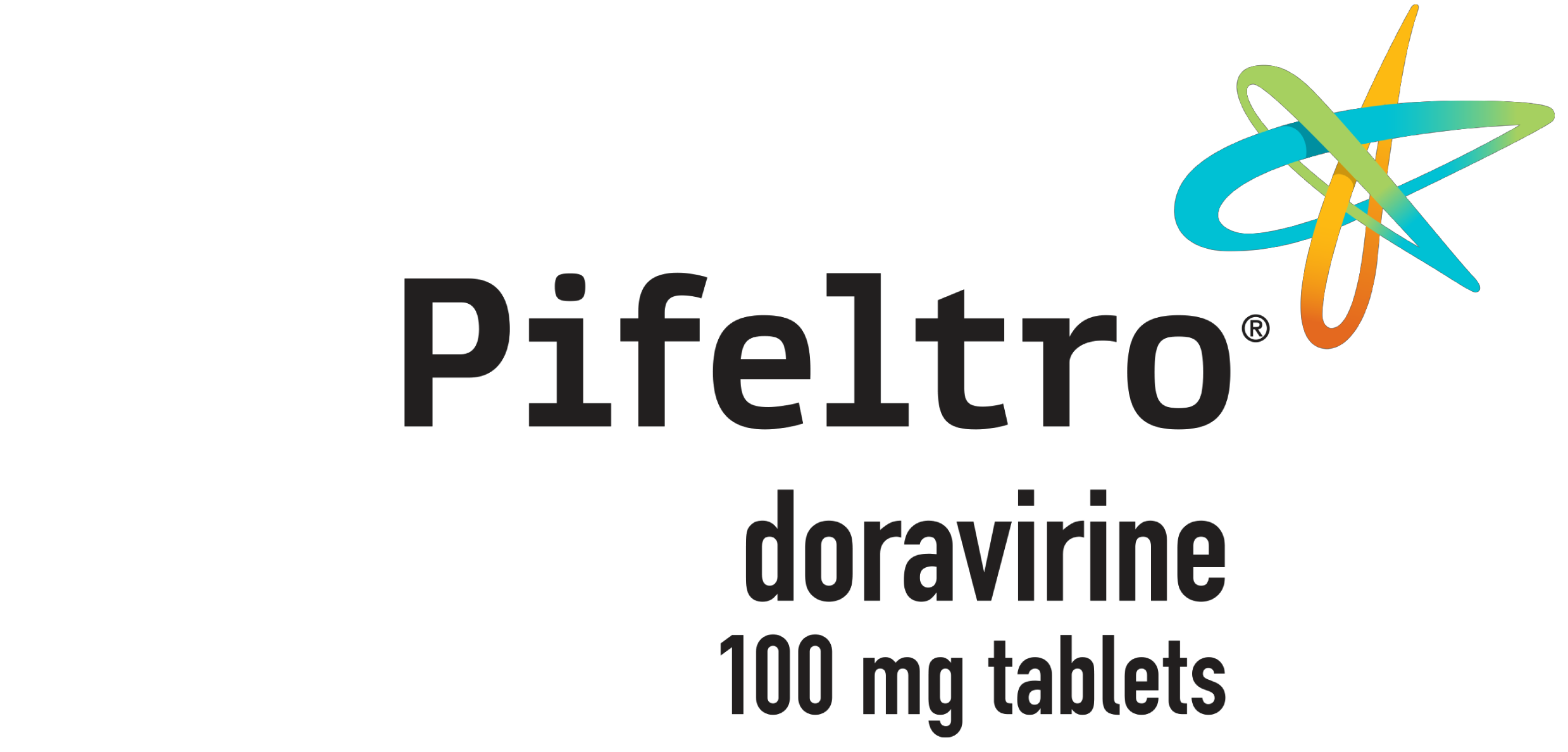Patient resources


Patient Brochure for PIFELTRO (English)
This brochure provides product information for your patients.


Patient Brochure for DELSTRIGO (English)
This brochure provides product information for your patients.
Patient Brochure for PIFELTRO (Spanish)
This brochure provides product information for your Spanish-speaking patients.
Patient Website for PIFELTRO (English)
Patient Website for DESTRIGO (English)
Patient Website for PIFELTRO (Spanish)
Selected Indications
PIFELTRO® (doravirine) is indicated in combination with other antiretroviral (ARV) agents for the treatment of HIV-1 infection in adult patients with no prior ARV treatment history or to replace the current ARV regimen in those who are virologically suppressed (HIV-1 RNA less than 50 copies per mL) on a stable ARV regimen with no history of treatment failure and no known substitutions associated with resistance to doravirine.
DELSTRIGO® (doravirine/lamivudine/tenofovir disoproxil fumarate) is indicated as a complete regimen for the treatment of HIV-1 infection in adult patients with no prior ARV treatment history or to replace the current ARV regimen in those who are virologically suppressed (HIV-1 RNA less than 50 copies per mL) on a stable ARV regimen with no history of treatment failure and no known substitutions associated with resistance to the individual components of DELSTRIGO.
Selected Safety Information
WARNING: POSTTREATMENT ACUTE EXACERBATION OF HEPATITIS B VIRUS (HBV) FOR DELSTRIGO
All patients with HIV-1 should be tested for the presence of HBV before initiating ARV therapy. Severe acute exacerbations of HBV have been reported in people with concomitant HIV-1 and HBV who have discontinued products containing lamivudine or tenofovir disoproxil fumarate (TDF), which are components of DELSTRIGO. Patients coinfected with HIV-1 and HBV who discontinue DELSTRIGO should be monitored with both clinical and laboratory follow-up for at least several months after stopping DELSTRIGO. If appropriate, initiation of anti-HBV therapy may be warranted.
Contraindications
PIFELTRO and DELSTRIGO are contraindicated when coadministered with drugs that are strong cytochrome P450 (CYP)3A enzyme inducers (including the anticonvulsants carbamazepine, oxcarbazepine, phenobarbital, and phenytoin; the androgen receptor inhibitor enzalutamide; the antimycobacterials rifampin and rifapentine; the cytotoxic agent mitotane; and the herbal product St. John’s wort (Hypericum perforatum)), as significant decreases in doravirine plasma concentrations may occur, which may decrease the effectiveness of DELSTRIGO and PIFELTRO.
DELSTRIGO is contraindicated in patients with a previous hypersensitivity reaction to lamivudine.
Warnings and Precautions
Severe Skin Reactions
Severe skin reactions, including Stevens-Johnson syndrome (SJS)/toxic epidermal necrolysis (TEN), have been reported during the postmarketing experience with doravirine-containing regimens. Discontinue PIFELTRO or DELSTRIGO, and other medications known to be associated with severe skin reactions, immediately if a painful rash with mucosal involvement or a progressive severe rash develops. Clinical status should be closely monitored, and appropriate therapy should be initiated.
New or Worsening Renal Impairment
Renal impairment, including cases of acute renal failure and Fanconi syndrome, have been reported with the use of TDF. DELSTRIGO should be avoided with concurrent or recent use of a nephrotoxic agent (eg, high-dose or multiple NSAIDs). Cases of acute renal failure after initiation of high-dose or multiple NSAIDs have been reported in people living with HIV with risk factors for renal dysfunction who appeared stable on TDF.
Prior to or when initiating DELSTRIGO, and during treatment, assess serum creatinine, estimated creatinine clearance, urine glucose, and urine protein in all patients. In patients with chronic kidney disease, also assess serum phosphorus. Discontinue DELSTRIGO in patients who develop clinically significant decreases in renal function or evidence of Fanconi syndrome. Discontinue DELSTRIGO if estimated creatinine clearance declines below 50 mL/min.
Bone Loss and Mineralization Defects
In clinical trials in adults living with HIV, TDF was associated with slightly greater decreases in bone mineral density (BMD) and increases in biochemical markers of bone metabolism. Serum parathyroid hormone levels and 1,25 Vitamin D levels were also higher. Cases of osteomalacia associated with proximal renal tubulopathy have been reported with the use of TDF. The effects of TDF-associated changes in BMD and biochemical markers on long-term bone health and future fracture risk in adults are unknown.
Immune Reconstitution Syndrome
Immune reconstitution syndrome can occur, including the occurrence of autoimmune disorders with variable time to onset, which may necessitate further evaluation and treatment.
Drug Interactions
Because DELSTRIGO is a complete regimen, coadministration with other antiretroviral medications for the treatment of HIV-1 infection is not recommended.
Coadministration of PIFELTRO with efavirenz, etravirine, or nevirapine is not recommended.
If DELSTRIGO is coadministered with rifabutin, take one tablet of DELSTRIGO once daily, followed by one tablet of doravirine (PIFELTRO) approximately 12 hours after the dose of DELSTRIGO.
If PIFELTRO is coadministered with rifabutin, increase PIFELTRO dosage to one tablet twice daily (approximately 12 hours apart).
Consult the full Prescribing Information prior to and during treatment for more information on potential drug-drug interactions.
Dosage and Administration/Specific Populations
Renal Impairment
Because DELSTRIGO is a fixed-dose combination tablet and the dosage of lamivudine and TDF cannot be adjusted, DELSTRIGO is not recommended in patients with estimated creatinine clearance less than 50 mL/min.
Adverse Reactions
The most common adverse reactions with DELSTRIGO (incidence ≥5%, all intensities) were dizziness (7%), nausea (5%), and abnormal dreams (5%). The most common adverse reactions with PIFELTRO (incidence ≥5%, all intensities) were nausea (7%), dizziness (7%), headache (6%), fatigue (6%), diarrhea (6%), abdominal pain (5%), and abnormal dreams (5%).
By week 96 in DRIVE-FORWARD, 2% of adult participants in the PIFELTRO group and 3% in the darunavir+ritonavir (DRV+r) group had adverse events leading to discontinuation of study medication.
By week 96 in DRIVE-AHEAD, 3% of adult participants in the DELSTRIGO group and 7% in the efavirenz (EFV)/emtricitabine (FTC)/TDF group had adverse events leading to discontinuation of study medication.
In DRIVE-FORWARD, mean changes from baseline at week 48 in LDL-cholesterol (LDL-C) and non-HDL-cholesterol (non-HDL-C) were pre-specified. LDL-C: -4.6 mg/dL in the PIFELTRO group vs 9.5 mg/dL in the DRV+r group. Non-HDL-C: -5.4 mg/dL in the PIFELTRO group vs 13.7 mg/dL in the DRV+r group. The clinical benefits of these findings have not been demonstrated.
In DRIVE-AHEAD, mean changes from baseline at week 48 in LDL-C and non-HDL-C were pre-specified. LDL-C: -2.1 mg/dL in the DELSTRIGO group vs 8.3 mg/dL in the EFV/FTC/TDF group. Non-HDL-C: -4.1 mg/dL in the DELSTRIGO group vs 12.7 mg/dL in the EFV/FTC/TDF group. The clinical benefits of these findings have not been demonstrated.
In DRIVE-SHIFT, mean changes from baseline at week 24 in LDL-C and non-HDL-C were pre-specified. LDL-C: -16.3 mg/dL in the DELSTRIGO group vs -2.6 mg/dL in the PI + ritonavir group. Non-HDL-C: -24.8 mg/dL in the DELSTRIGO group vs -2.1 mg/dL in the PI + ritonavir group. The clinical benefits of these findings have not been demonstrated.
In DRIVE-AHEAD, neuropsychiatric adverse events were reported in the three pre-specified categories of sleep disorders and disturbances, dizziness, and altered sensorium. Twelve percent of adult participants in the DELSTRIGO group and 26% in the EFV/FTC/TDF group reported neuropsychiatric adverse events of sleep disorders and disturbances; 9% in the DELSTRIGO group and 37% in the EFV/FTC/TDF group reported dizziness; and 4% in the DELSTRIGO group and 8% in the EFV/FTC/TDF group reported altered sensorium.
The safety of DELSTRIGO in virologically-suppressed adults was based on week 48 data from participants in the DRIVE-SHIFT trial. Overall, the safety profile in virologically-suppressed adult participants was similar to that in participants with no ARV treatment history.
Pregnancy/Breastfeeding
There is a pregnancy exposure registry that monitors pregnancy outcomes in individuals exposed to PIFELTRO or DELSTRIGO during pregnancy. Healthcare providers are encouraged to register patients by calling the Antiretroviral Pregnancy Registry (APR) at 1-800-258-4263.
Inform individuals with HIV-1 infection of the potential risks of breastfeeding, including: (1) HIV-1 transmission (in HIV-1–negative infants), (2) developing viral resistance (in HIV-1–positive infants), and (3) serious adverse reactions in a breastfed infant similar to those seen in adults.
Specific Populations
Renal Impairment
No dosage adjustment of PIFELTRO is necessary for patients with mild, moderate, or severe renal impairment. PIFELTRO has not been adequately studied in patients with end-stage renal disease and has not been studied in dialysis patients.
Because DELSTRIGO is a fixed-dose combination tablet and the dosage of lamivudine and TDF, both components of DELSTRIGO, cannot be altered, DELSTRIGO is not recommended in patients with estimated creatinine clearance less than 50 mL/min.
Hepatic Impairment
No dosage adjustment is necessary for patients with mild to moderate hepatic impairment. PIFELTRO and DELSTRIGO have not been studied in patients with severe hepatic impairment.
Before prescribing PIFELTRO® (doravirine), please read the accompanying Prescribing Information. The Patient Information also is available.
Before prescribing DELSTRIGO® (doravirine/lamivudine/tenofovir disoproxil fumarate), please read the accompanying Prescribing Information, including the Boxed Warning about posttreatment acute exacerbation of Hepatitis B. The Patient Information also is available.


